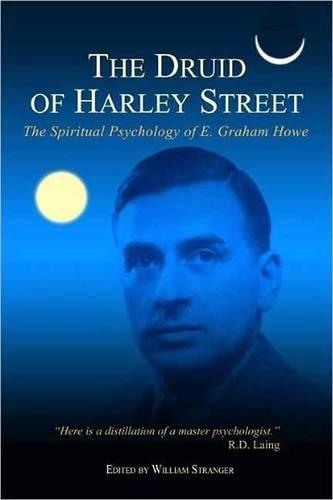
The Druid of Harley Street: The Spiritual Psychology of E. Graham Howe
(Paperback)
Publishing Details
The Druid of Harley Street: The Spiritual Psychology of E. Graham Howe
By (Author) E. Graham Howe
Edited by William Stranger
Introduction by William Stranger
North Atlantic Books,U.S.
North Atlantic Books,U.S.
15th March 2012
United States
Classifications
General
Non Fiction
Mind, body, spirit
150
Physical Properties
Paperback
640
Width 153mm, Height 230mm, Spine 45mm
943g
Description
In early 20th-century Britain, interest in psychoanalysis was high, leading to the formation of the famous Tavistock Clinic in 1920. E. Graham Howe was one of the clinic's founders and the first to publish articles on psychotherapy. At the same time, he was attacked by the "scientific" psychiatry and psychoanalysis communities because he took concepts derived from spiritual practice and existential phenomenology and applied them to an understanding of psychotherapy. Howe's writings included more than a dozen books and countless articles on a broad range of subjects from schizophrenia to Asian spiritual practices. Through these works he exerted a profound influence on intellectuals such as R. D. Laing, Alan Watts, and Henry Miller, to name a few. Howe also wrote in a simple and clear style, making his work accessible to the general public. The Druid of Harley Street samples the best of his essays, offering timely insights for followers of Jung, Roberto Assagioli, and Mark Epstein; students of somatic therapies; and spiritual and meditation practitioners. The book also offers a fascinating glimpse of a great mind, the notable people in his life, and the heady times in which he lived.
Reviews
"An extraordinary labor of love that finally makes the teachings of E. Graham Howe brilliantly available to a wide audience ... This book is destined to become a classic." M. Guy Thompson, Ph.D, author of The Ethic of Honesty: The Fundamental Rule of Psychoanalysis
"This is a remarkable book. I know of no other work that so intelligently embraces and illuminates the complexities of the ego-Self relationship." Nathan Schwartz-Salant, Ph.D., author of Narcissism and Character Transformation: The Psychology of Narcissistic Character Disorders
"An exciting, challenging work that helps us look beyond our smaller attitudes and seek a broader, fuller path. Uplifting and therapeutic." Michael Eigen, Ph.D., Associate Clinical Professor of Psychology at New York University and Editor Emeritus of The Psychoanalytic Review
"This book is a tour de force that under one cover includes selections from all of Howes writings. Howe illuminates the causes of human suffering by using the language of psychoanalysis to help us understand the mystery of human experience. It is a wonderful book for both psychotherapists and the general reader to gain greater understanding of what it means to be human." John M. Heaton, M.D., author of The Talking Cure: Wittgenstein's Therapeutic Method for Psychotherapy
"... Because psychoanalysis, psychotherapy, and psychiatry came of age in a secularized world, these are typically regarded as a matter unto themselves, both generated and cured without reference to our spiritual nature. In this landmark and vitally necessary book, the great English psychiatrist E. Graham Howe not only disproves that presumption but provides us with our eras first truly esoteric and integral psychology. Graciously written, profoundly wise, The Druid of Harley Street is itself an instructive, healing, and liberating meditation that should be in the hands of every psychotherapistand by the bedsides of the rest of us." Andrew Harvey, author of A Walk with Four Spiritual Guides: Krishna, Buddha, Jesus, and Ramakrishna and The Hope: A Guide to Sacred Activism
"Among the pathfinders of modern psychology, E. Graham Howe was unique in recognizing that, in addition to being the highest biological life form on Earth, human beings are also manifestations of an immanent and omnipresent creative principle, or spirit. Whether discussing relationship or neurosis or schizophrenia or therapy, Howe never lets us forget that the integration of our dual nature is the necessary means and ultimate goal of the growth process. William Stranger's lucid introduction and deft editing afford us an in-depth and most satisfying look at the work of this profound visionary." Gabor Mat M.D., author of In The Realm of Hungry Ghosts: Close Encounters With Addiction
Author Bio
Eric Graham Howe was born in England in 1896. After encountering Sigmund Freud's work, he set forth to become a psychiatrist and conduct clinical psychiatric work. He published a series of articles on psychology in the Lancet that were later made into a book called Motives and Mechanisms of the Mind (1931), making Howe famous. He helped found the psychoanalysis-based Tavistock Clinic in 1920, and was the consulting psychiatrist at West Herts Hospital; chief assistant, Mental Department, St. Thomas Hospital; and house physician, Bethlem Royal Hospital. His open-minded eclecticism and unwillingness to conform to Western psychiatric methods brought him into association with major spiritual figures who came to England's capital. Howe's books, including The Triumphant Spirit- A Study of Depression (1943, Faber & Faber) and A Psychologist at Work (1952), remain useful works of psychological wisdom written for spiritual practitioners and mental health professionals.
